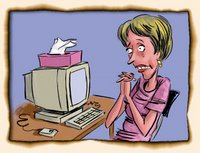
Fellow bloggers, political browsers, and members of Daily Kos are the privileged ones. We can handle ourselves on the Internet; find what we want; view and listen and comment. We're not intimidated by blogs, vlogs, podcasts, etc. And when it comes to campaigning, we're more interested in getting the facts on our own rather than being told what they are through advertisements.
So who are the underprivileged; the resistant*?
 This group is equally important because they are also prime targets for the 2008 Election Cycle. If we don't find and identify this group they might miss the massive amount of real information, our candidate's information, and the pleasure of independent research.
This group is equally important because they are also prime targets for the 2008 Election Cycle. If we don't find and identify this group they might miss the massive amount of real information, our candidate's information, and the pleasure of independent research.People who were 12 or younger in 1992 were on the cusp of the Internet revolution. They learned it and took it for granted and are adept at navigating and searching for whatever they want. They gather information as they become interested; they participate when the feel like it; they buy confidently, contribute freely, and disseminate regularly. So the campaign pitch to those folks is to interest them in finding out more; doing more; thinking more; participating more; contributing more.
The older groups of 1992 contained many of the resisters, particularly in the 1992 age range of 40-65 who are now 55-80. Some of the seniors within that group have learned what it is and how to use it because it's their primary source of communication with their dispersed families, but they're not really at ease with all the capabilities and features. The remaining group of AARP-elegibles are prime targets for traditional advertising and also for sympathetic Internet training.
Segmenting the electorate into Internet saavy versus traditional and also by Internet resistance versus taking it for granted are necessary first steps toward making the 2008 Presidential Election our first real Internet-as-primary-media election.
Bob Schieffer of CBS News made a good point when he hosted "The Charlie Rose Show" and interviewed Jonathan Alter of Newsweek a few weeks ago. He said:
Successful presidents have all skillfully exploited the dominant medium of their times.
- The Founders were eloquent writers in the age of pamphleteering.
- Franklin D. Roosevelt restored hope in 1933 by mastering radio.
- John F. Kennedy was the first president elected because of his understanding of television.
- And with an issue as eye-glazing as the deficit, a wacky, jug-eared Texan named Ross Perot received 19 percent of the vote. He did it with "Larry King Live" and an 800 number.
Howard Dean and later John Kerry showed that the whole idea of "early money" is now obsolete in presidential politics. The Internet lets candidates who catch fire raise millions in small donations practically overnight. That's why all the talk of Hillary Clinton's "war chest" making her the front runner for 2008 is the most hackneyed punditry around. Money from wealthy donors remains the essential ingredient in most state and local campaigns, but "free media" shapes the outcome of presidential races, and the Internet is the freest media of all. Finally, since at least a quarter of the voting population voting early or absentee, traditional methods of advertising are diluted further still.
The 2008 presidential election cycle will begin shortly. I believe, like Schieffer, that he who masters the prevailing media will win. That media used to be TV but by 2008 it will be the Internet - and we are all players in this new drama.
Be sure to vote.
* Cartoonist Mike Reed became famous a few years ago because of a flame-out he had with a few people on a digital arts forum. He was silent for a few weeks and then came back with a dozen cartoons that expressed his anger. Appreciation of those cartoons led to a book called "Flame Warriors."